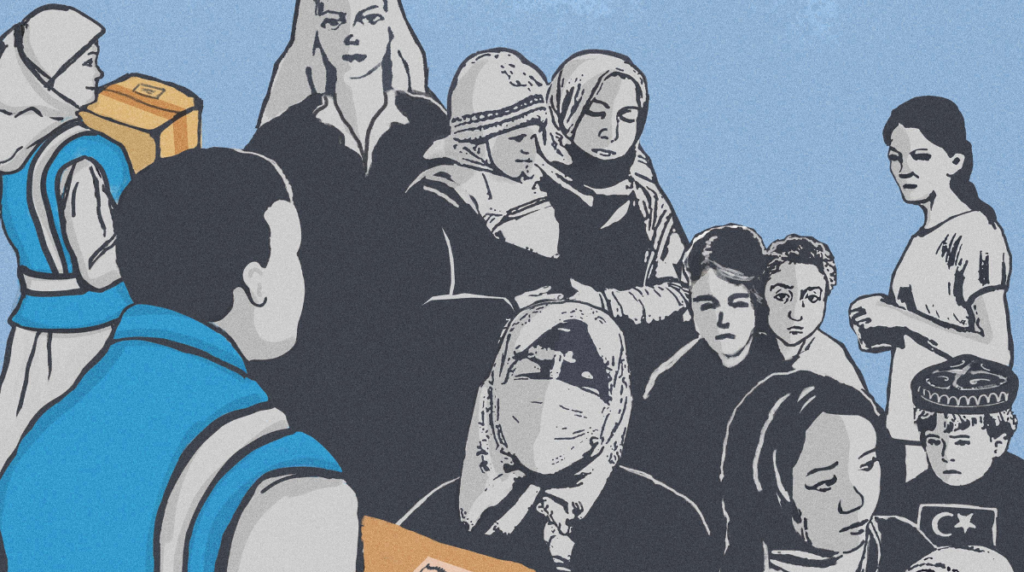New UHRP Report Documents Humanitarian Needs of the Uyghur Diaspora, Calls for Support for Uyghur Civil Society

February 1, 2023 | 6:00 a.m. EST
For Immediate Release
Contact: Omer Kanat +1 (202) 819-0598, Peter Irwin +1 (646) 906-7722
The Uyghur Human Rights Project’s (UHRP) new report, On the Fringe of Society: Humanitarian Needs of the At-Risk Uyghur Diaspora, details the humanitarian needs of Uyghur and other Turkic diaspora groups in the United States, Turkey, and post-Soviet Central Asia.
The at-risk Uyghur communities in these places include hundreds of orphans and other traumatized survivors of the Chinese government’s genocide. UHRP conducted fieldwork and interviews with diaspora community leaders to document ongoing humanitarian needs and the ongoing transnational repression heightening the risks faced by displaced Uyghurs. The report identifies key areas where international help is needed.
The study calls on donors, including government agencies, to extend support for livelihood and small-business programming; hunger and homelessness relief; healthcare programs; and funding for Uyghur NGOs that seek to document ongoing human rights violations in the Uyghur region.
In releasing the report, UHRP Executive Director Omer Kanat said, “For genocide response to mean anything, caring for the survivors must be a priority. I urge donors and national governments to grasp the urgency of the findings in this report.”
“This report is among the first to document the clear link between China’s campaign of transnational repression and the inability of international aid workers to effectively provide care to Uyghur refugees,” said Bradley Jardine, managing director of the Oxus Society for Central Asian Affairs and lead author of the report. “Beijing’s use of global surveillance networks, economic pressure, and its withholding of vital travel documents have left thousands of Uyghurs homeless, socially marginalized, and vulnerable.”
The Chinese Party-state’s human rights atrocity crimes in the Uyghur region have caused a secondary humanitarian crisis among Uyghur diaspora communities worldwide. Since 2017, China’s mass incarceration of Turkic peoples in the Uyghur region has affected Uyghurs, Kazakhs, and Kyrgyz worldwide, leaving many destitute and traumatized as their family members, including the primary providers, are interned in concentration camps.
The Chinese state actively interferes with the ability of Uyghur exiles to meet their basic humanitarian needs, often with the help of foreign governments, subjecting them to harassment, intimidation, surveillance, enforced statelessness, family separation, and community and cultural trauma.
“As a result of this repression, Uyghurs’ mental, social, economic, and cultural well being has been threatened. Uyghur individuals report challenges with supporting themselves and their families, including housing, consistent employment, medical treatment, and food,” said Natalie Hall, non-resident fellow at the Oxus Society for Central Asian Affairs, a co-author of the report. “Others report challenges with their mental health, including anxiety, depression, and guilt, often connected to the sustained collective trauma of China’s atrocities.”
“These needs are not being consistently met by the Uyghur diaspora communities’ host states,” said Louisa Greve, UHRP Global Advocacy Director, also a report co-author. “Diaspora community and civil society organizations have been left to fill the gap with very little outside assistance.”
UHRP is requesting international humanitarian agencies and organizations to step up their programming to meet the needs of Uyghur genocide survivors and secondary survivors, including skills training and support for home-based employment; scholarships for students; cash support for housing, food, clothing, and medical care; and support for urgent social needs, including cultural programming and trauma-informed community support.
The Chinese government’s strategies have created trauma, economic dislocation, and familial separation wherever deployed. UHRP and its partner, the Oxus Society for Central Asian Affairs, have documented this extraterritorial pursuit of Uyghurs and other Turkic peoples around the world in a series of five reports shedding light on the scope of this campaign since 2017, following on UHRP’s earlier reports on the issue. To read more, please visit: uhrp.org/transnational-repression.
